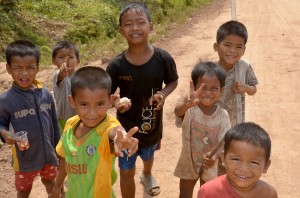Siem Reap, Cambodia
 She is perhaps five or six, with dark eyes, straight black hair that touches the back of her neck, and skin the color of teak.
She is perhaps five or six, with dark eyes, straight black hair that touches the back of her neck, and skin the color of teak.
She dances up to the picnic table with a white smile and 10 postcards of the ancient temples at Angkor Wat.
Her sales pitch is short and achingly sweet.
Though she could not articulate it at this tender age, instinct tells her she has found an American abroad who cannot deny a poor Cambodian child this one small sale.
She is one of dozens of rural children in the same predicament on this patch of ground within one of the most important archaeological sites in the world.
More than a million international visitors visit the Angkor complex in Siem Reap each year to walk amid the remains of the Khmer Empire.
None of that matters to the dark-haired little salesgirl. There are thousands more like her throughout the nation, all driven by extreme poverty (one dollar is worth more than 4,000 Cambodian Riels) to swarm any tourists who appear willing to trade a buck for fruit, bracelets, and other trinkets.
It is a step above begging, but a small step. Per capita income in Cambodia was $946 in 2012, compared to nearly $5,500 in neighboring Thailand, and about $50,000 in the U.S., according to the World Bank.¹
Some more pieces from UNICEF fill out the puzzle:
– While poverty fell from 47 percent of the population in 2003 to 30 percent in 2007, only one in two Cambodians has access to safe drinking water while less than one in four has access to a toilet.*
– Despite improvements, Cambodia’s maternal mortality ratio remains high, at 206 per 100,000 live births. UNICEF says many infants and young children still suffer from malnutrition, and the crisis is worst in rural areas.*
– Less than 20 percent of Cambodian children aged three to five benefit from early childhood development programs.*
– And only 25 percent of Cambodia’s rural population has access to sanitation, while only 53 percent has access to improved sources of drinking water.*
On it goes.
While little could match the devastation wrought by the Khmer Rouge regime from 1975-1979, years during which 1.7 million Cambodians died (see The Killing Fields), the nation still faces epic challenges.
Least equipped to tackle the job are the kids, which is why their work – day in and day out, in pouring rain or blinding sunshine – is to wait for tourists, knick-knacks in hand, wide eyes and a smattering of persuasive English phrases always at the ready, and then pounce.
These children do not hear the word “no” as American children hear it. They barter, pester, and plead with an aggressiveness that’s hard to imagine. And if a tourist gives in, the response is not a quiet thank you, but a forceful plea to buy more. It may seem ungrateful, even rude. If so, if you find yourself tempted to issue a reprimand, this is the time to remember that the rudeness is born of desperation.
¹ Source: World Bank
* Source: UNICEF
Read more posts by Steve Piacente, a former print journalist and correspondent. Steve is a blogger for JenningsWire.





